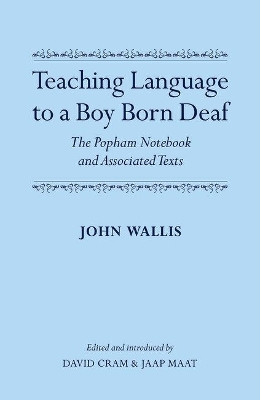
Teaching Language to a Boy Born Deaf
Oxford University Press (Verlag)
978-0-19-967708-5 (ISBN)
This book presents an edition of a previously unpublished notebook used by the seventeenth-century polymath John Wallis to teach language to the 'deaf mute' Alexander Popham. Under the terms of the law Popham would not have been able to inherit his family title and property if he had remained unable to speak. This is one of the most famous cases in the history of deaf education. The notebook, which has recently come to light in the Popham family mansion, provides fascinating insights into the details of the instruction. It is a rare example of a manual tailor-made for the instruction of a known individual and its author is one of the foremost scientists of the period. If it had not been lost the work would have been a key document in the dispute between John Wallis and William Holder, both distinguished fellows of the Royal Society, on whose method had been successful in teaching Popham to speak. The Popham Notebook provides essential evidence towards the resolution of a debate that has been widely discussed ever since.
David Cram and Jaap Maat place the work in its personal, social, and scientific contexts. They include a range of additional contemporary texts and provide a clear text with helpful annotations. The edition provides the means for a thorough reassessment of the work's contemporary value. Their introduction also includes a discussion of the theoretical issues underpinning the teaching of language to the deaf.
John Wallis (1618-1703) was a founder member of the Royal Society, a mathematician and pioneer of calculus, and a linguist whose work included the groundbreaking tract on phonetics, De Loquela (1653). David Cram is an Emeritus Fellow of Jesus College, formerly Senior Research Fellow and Lecturer in Linguistics. By background and training he is a theoretical linguist, but the bulk of his research has concerned the history of ideas about language in the seventeenth century, on topics ranging from philosophical languages to linguistic eschatology. He is co-editor, with Jaap Maat, of George Dalgarno on Universal Language: The Art of Signs (1661), The Deaf and Dumb Man's Tutor (1680), and the Unpublished Papers (OUP, 2001). Jaap Maat is Lecturer in Philosophy at the University of Amsterdam, and is a member of the Institute for Logic, Language and Computation (ILLC). He has published widely on the history of linguistic ideas and the history of logic. He is a founding editor of History of Humanities and co-editor, with David Cram, of George Dalgarno on Universal Language: The Art of Signs (1661), The Deaf and Dumb Man's Tutor (1680), and the Unpublished Papers (OUP, 2001).
INTRODUCTION; PART I: THE POPHAM NOTEBOOK; PART II: THE EDUCATION OF ALEXANDER POPHAM; PART III: AFTERMATH AND LEGACY
| Erscheinungsdatum | 16.04.2018 |
|---|---|
| Verlagsort | Oxford |
| Sprache | englisch |
| Maße | 162 x 240 mm |
| Gewicht | 676 g |
| Themenwelt | Schulbuch / Wörterbuch |
| Geschichte ► Teilgebiete der Geschichte ► Kulturgeschichte | |
| Geschichte ► Teilgebiete der Geschichte ► Militärgeschichte | |
| Geisteswissenschaften ► Philosophie ► Geschichte der Philosophie | |
| Geisteswissenschaften ► Philosophie ► Sprachphilosophie | |
| Geisteswissenschaften ► Sprach- / Literaturwissenschaft ► Sprachwissenschaft | |
| Medizin / Pharmazie ► Medizinische Fachgebiete ► HNO-Heilkunde | |
| Studium ► Querschnittsbereiche ► Geschichte / Ethik der Medizin | |
| Naturwissenschaften | |
| Recht / Steuern ► Rechtsgeschichte | |
| Sozialwissenschaften ► Pädagogik | |
| ISBN-10 | 0-19-967708-5 / 0199677085 |
| ISBN-13 | 978-0-19-967708-5 / 9780199677085 |
| Zustand | Neuware |
| Haben Sie eine Frage zum Produkt? |
aus dem Bereich


